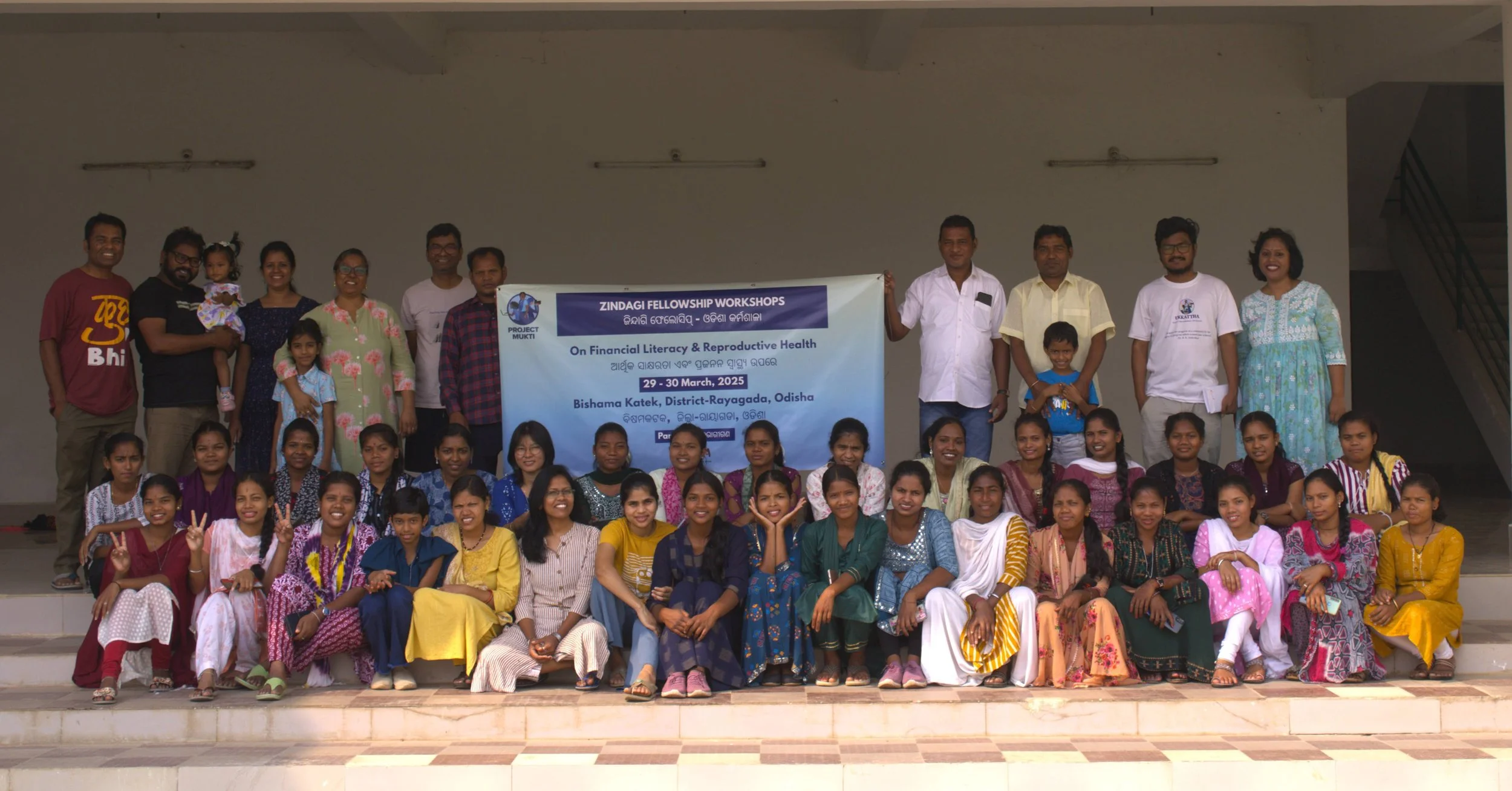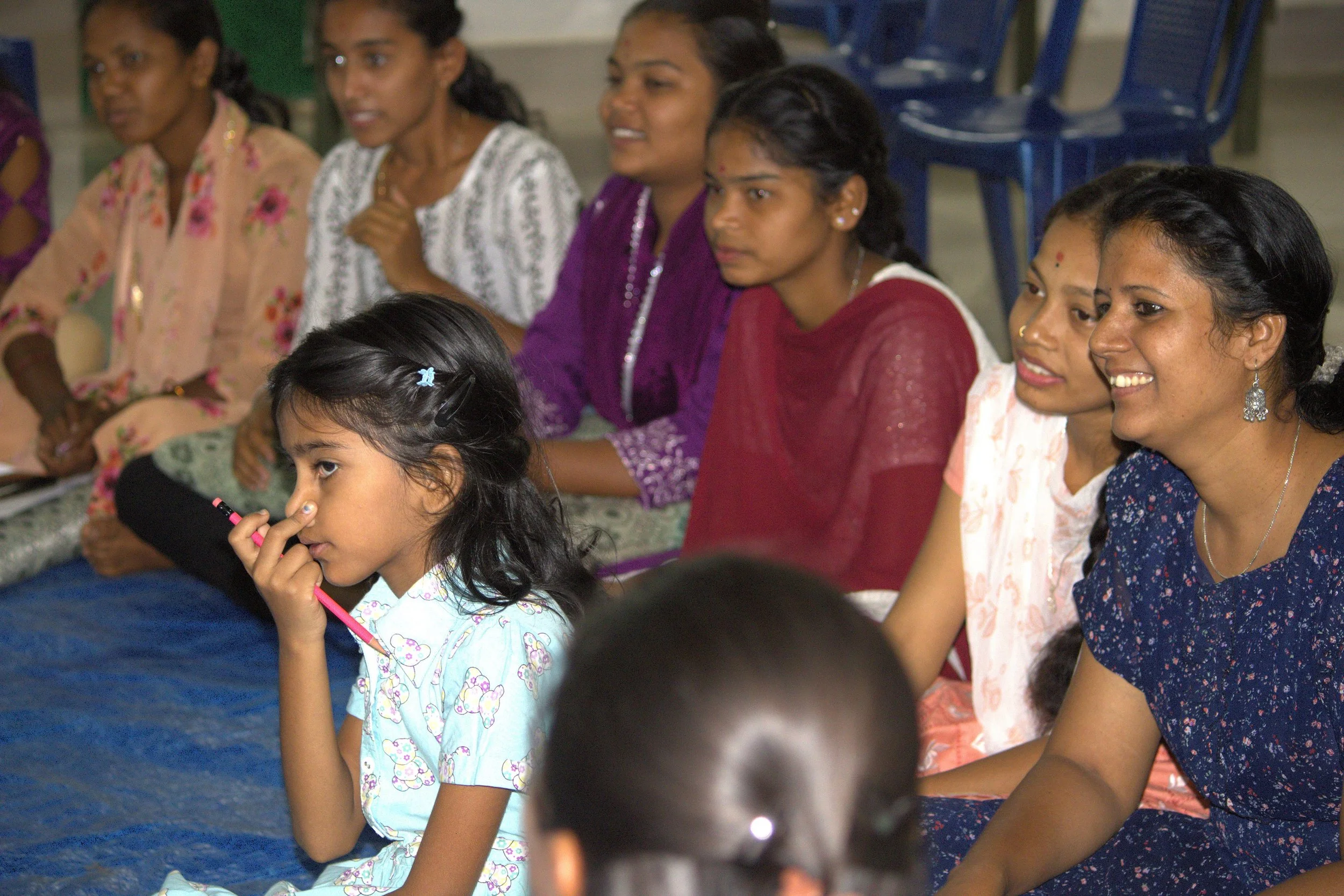Zindagi Fellowship Odisha Workshops
This two-day residential workshop was our first outreach in South Odisha, designed to connect with tribal women who have often been left out due to network and logistical gaps during our previous Zindagi Fellowship cycles. These workshops were an intentional step to address that gap. The primary purpose was to build productive relationships with women from South Odisha, particularly from Scheduled Tribe (ST) and Scheduled Caste (SC) communities.
Location: Bissamcuttack, Rayagada, Odisha
Date: 29th & 30th March 2025
Total Participants: 35
Facilitators: Dr. Manisha Meshram, Outreach Lead & Facilitator, Zindagi Fellowship, and Subhankar Barman. Outreach Associate & Facilitator, Zindagi Fellowship
Objectives
We aimed to connect with women through organisations working in South Odisha, a region largely inhabited by Scheduled Tribe (ST) communities. Our goal was to build their understanding of financial independence and women’s health. We especially wanted to identify and encourage women who are eager to learn, interested in entrepreneurship, job readiness, personal growth, and bringing social change, to apply for our Zindagi Fellowship program. Another important objective was to build long-term partnerships with local NGOs working at the grassroots level in South Odisha. These collaborations are essential to ensure our future programs are inclusive, rooted in local realities, and create meaningful impact.
Process
To reach the target communities, we connected with multiple NGOS and grassroots community organisers operating in the tribal regions of South Odisha. We identified and collaborated with four key organisations: National Environment & Education Development(NEED), AASTHA, South Orissa Voluntary Action (SOVA), and KMT. These organisations helped us identify women participants and provided logistical support for the workshop.
We designed the engagement as a two-day residential workshop, which allowed for in-depth interaction and immersive learning on financial literacy and women's health. The sessions were interactive, inclusive, and conducted in a safe and supportive environment.
Day 1: Financial Literacy and Empowerment
The first day focused on financial literacy, an essential skill for women aiming for entrepreneurship and financial independence.
The session covered:
Savings habits and alternatives to investing money in different government schemes.
Government schemes and financial tools such as:
Public Provident Fund (PPF)
Sukanya Samriddhi Yojana
Atal Pension Yojana (APY)
Mahila Samman Savings Certificate (MSSC)
Recurring and Time Deposits
Basics of mutual funds and the stock market.
Introduction to mobile banking, digital transactions, and UPI platforms
Participants were encouraged to think of their long-term goals—education for children, starting a business, and home improvement—and explore financial tools to achieve them
Day 2: Women's Health and Well-being
The second day of the workshop focused on reproductive and sexual health—an often neglected but critically important topic in rural and tribal communities. The session was designed to create a safe and inclusive space for women to learn, share, and question the information related to their bodies and well-being.
Understanding the Female Body Across Life Stages
The session began with a body mapping demonstration to discuss physical and emotional changes experienced by women during:Menstruation – biological processes, hormonal shifts, emotional responses
Pregnancy – bodily care, antenatal checkups, myths vs facts
Menopause – symptoms, emotional health, and self-care practices
Menstrual Hygiene Management (MHM)
Importance of using clean sanitary products
Discussion on availability, affordability, and taboos
Traditional vs modern menstrual products: pads, cloths, menstrual cups
Safe disposal practices and awareness of infections
Safe Pregnancy and Maternal Health
Nutritional needs during pregnancy and lactation
Dangers of anemia and iron deficiency
The importance of institutional delivery, postnatal care, and vaccinations
Awareness about maternal mortality in tribal areas
Post-partum
Sexual and Reproductive Rights
Introduction to consent and bodily autonomy
Family planning methods and access to contraception
Importance of sexual agency and informed decision-making
Addressing Myths and Taboos
Open conversation to debunk prevalent myths about menstruation, infertility, and sexual health
Shared stories and experiences from participants across different age groups
Role-play activities helped women express challenges they face at home and in society
Outcomes & Participant Response:
Many participants acknowledged that this was the first time they were openly discussing these issues.
Several women reported feeling more informed and less ashamed of their natural bodily processes.
There was strong interest in continued workshops and community-based support groups.
Participants suggested including adolescent girls in future sessions.
Language & Approach:
The session was conducted in simple Hindi, with explanations and discussions translated into Odia wherever needed.
Visual aids, flipcharts, and culturally resonant illustrations were used to enhance understanding.
Media & Film Screening
To make the sessions more relatable, we screened three short films in the evening:
Devi (A Powerful Portrayal of Women’s Solidarity): Devi brings together women from different backgrounds who are survivors of violence. The film shows how they support each other and stand united against injustice.
Teaspoon (Exploring Caregiving and Gender Roles): The film highlights the emotional stress of a daughter-in-law caring for her demanding father-in-law and questions how caregiving responsibilities are unfairly placed on women.
Juice (A Reflection on Patriarchy in Daily Life): Juice shows how men relax while women work in the kitchen during a family gathering. It reflects everyday patriarchy and ends with a woman quietly challenging the norm.
These films were followed by open discussions, during which participants shared personal stories and reflections, further deepening the learning experience.
Outcomes
The workshop successfully met its intended objectives and created a strong foundation for future engagement.
Key Outcomes:
Direct Engagement with ST and SC Women:
We engaged with 35 women and a few adolescent girl participants, the majority from ST and SC backgrounds. Many expressed interest in entrepreneurship and career-building opportunities.
Zindagi Fellowship Awareness:
The workshop served as an introduction to our Zindagi Fellowship. Participants were enthusiastic and curious, and several expressed interest in applying for the next cohort.
Organisational Partnerships:
We built strong connections with NGOs we collaborated with – NEED, AASTHA, SOVA, and KMT – who agreed to support our future programs in Odisha. These partnerships are expected to play a critical role in identifying and mentoring future fellows from the region.
Safe Space Creation:
The residential nature of the workshop allowed participants to step away from daily responsibilities and engage in conversations often considered taboo, like menstruation and financial decision-making. This contributed to confidence-building and a greater sense of agency among participants.
Capacity Building:
Participants gained practical knowledge about health and finance, which may help them make informed decisions for themselves and their families in the future.
Cultural Sensitisation for the Fellowship Team:
This experience gave our team valuable insights into the local cultural, linguistic, and socio-economic dynamics of South Odisha. These learnings will help us design more localised and context-sensitive interventions in the future.
Future Steps
Follow-up meetings to ensure continued engagement with participants
Application support for interested women who wish to apply for the Zindagi Fellowship
Skill-building workshops (e.g., digital literacy, leadership, entrepreneurship) in collaboration with the partner NGOS
Conclusion
The Odisha workshop was a great experience for the participants and the Project Mukti team. It allowed us to step into a new geography, understand local challenges, and connect with inspiring women full of ideas and resilience. We look forward to building and creating a more inclusive, diverse, and impactful fellowship program in the future.











